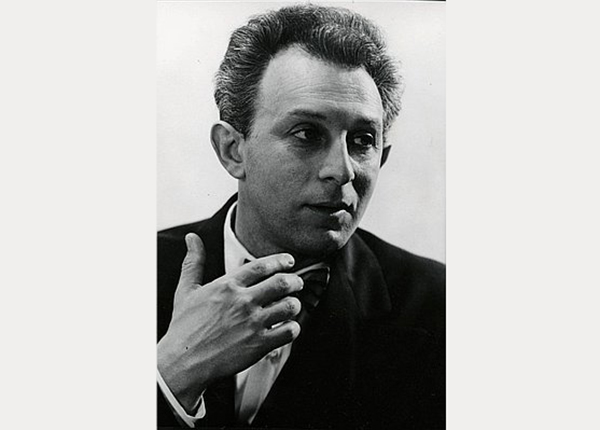Avshalomov/Bernstein 7: The Taking of T’ung Kuan 1
Posted on January 28, 2019

Avshalomov wrote The Taking of T’ung Kuan as his master’s thesis at Eastman, age 24. He described its genesis:
“Here I was then, at the famous Eastman School of Music, one of the schools which father had suggested years back. He had so many ideas for me that I was bound to take up one or another of them sooner or later. His Chinese influence was not forgotten here either. When the time came, I wrote for my Master’s thesis “The Taking of Tung [sic] Kuan” – inspired by an 8th century poem by Li Po. It described the coming of the barbarian horde and the “army of the House of Han” going out to resist it: “came the barbarian horde with the autumn/ out went the army of the House of Han…” The score gathered up the remembered sounds of Father’s music, the texture of his orchestration, the experience I’d gained from writing “The Little Clay Cart”, and the nostalgia I felt for the land of my birth.”
(AWW, p. 177).
Historical Background: The years of the ‘rebellion’ when An Lushan swept into power were some of the most devastating in the history of North China. In particular, the battle of T’ung Kuan (now Tongguan or Dongguan) was a turning point in the rebellion; An, a treacherous Tang Dynasty insider who betrayed the Tang emperor who had favored him, killed and pillaged his way through the countryside to the capital.
“Originally, An Lushan’s forces were blocked from the main imperial (or “Western”) capital at Chang’an (modern Xi’an), by loyal troops placed in nearly impregnable defensive positions in the intervening high mountain passes of Tongguan. Unfortunately for Chang’an, the two generals in charge of the troops at Tong Pass, Gao Xianzhi and Feng Changqing, were executed due to a court intrigue involving the powerful eunuch Bian Lingcheng. Yang Guozhong, with grossly inept military judgment, then ordered the replacement General Geshu Han, who was in charge of the troops in the passes, together with reinforcement troops, to attack An’s army on open ground. The Tang forces were defeated, and the road to the capital now lay open.”
(Wikipedia: An Lushan rebellion)
The battle of T’ung Kuan was a pivotal victory, allowing An Lushan to continue on his bloody, epically destructive path to conquer Chang’an and establish the rival Yan “dynasty” in North China, which after all that waste of life and treasure, ended up lasting less than ten extremely chaotic years Little wonder that a young composer who had spent his childhood in North China would be drawn to this cataclysmic episode as inspiration for a tone poem.
Li Bai (also known as Li Po), the revered, national treasure poet who wrote the poem that inspired the piece, stayed on the Tang side but unfortunately aligned himself with a subgroup that lost its bid for power. He found himself almost sentenced to death, but then reduced to exile; because he was so beloved and so many highly-placed people advocated for him, however, before he could get fully out of the country he was pardoned.
The few lines available of this poem, or sometimes identified as a pair of poems, are so different from anything else he wrote; most of his poems are highly emotional and spiritual, involving nature and nostalgic longing for home (as well as a fair amount of wine: one famous poem is called “Waking from Drunkenness on a Spring Day”); his only other well-known poem involving war decries the uselessness and waste of it. One can imagine that maybe he wrote this particular poem to demonstrate his loyalty to the Tang side, as he calls An’s side “the barbarian horde”?
The historical background serves as inspiration, not as roadmap, however. Avshalomov’s friend from Eastman, composer William Bergsma, wrote: “It is instead an evocation, presumably of a battle, presumably Chinese, but leaving the listener his part in the imagining. Each hearer can participate and make his own background; meanwhile the music takes over.” (Bergsma, p. 4)
Similar to the Jeremiah, “the father” is explicitly present here in several ways. The handwritten score on the 1988 revision PYP will be working from indicates that T’ung Kuan is dedicated “To the memory of Jacques Gershkovitch”, his foster-father. Avshalomov also acknowledged a clear debt to his own father’s musical influence in his early work; in a later interview with Bruce Duffie, Avshalomov reflected on the influence of Chinese musical elements “or the whole Chinese culture”:
“It’s quite noticeable in the early works, and less and less the closer we get to the present. From ’37 to about ’45 or ’46, almost everything I wrote had some Chinese influence, in the sense that the melodies I used were apt to be cast in the pentatonic mode, and the texture was apt to be more contrapuntal than harmonic, with the avoidance of triadic structures and seventh chords. It gave quite an oriental cast, and this was also apparent in the coloration of the orchestration with the use of percussion and things of that kind. But the longer I lived here, the further I got away from China and the fainter those memories were, the less truthful they were to my present existence, you might say. So without ever consciously relinquishing it, it just sort of faded a little like old ink.”
All of this personal and cultural influence is easily heard in “T’ung Kuan”, just as the Hebrew liturgical influences of Bernstein’s youth are heard in the Jeremiah.
Next: The Taking of T’ung Kuan 2
Carolyn Talarr, Community Programs Coordinator

0 Comments :